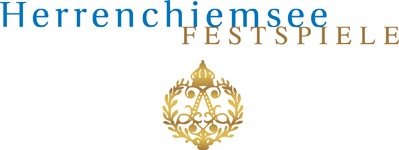»NIGHT MUSIC«
THE SEPARATE PERFORMANCES.
It would be a misunderstanding to believe that King Ludwig II of Bavaria paid homage solely to the works of Richard Wagner in his separate performances. His interests extended further. In addition to the classical and modern opera repertoire of his era, he saw and heard numerous performances of spoken theater, including several plays that he himself had commissioned. He enjoyed symphonic concerts of all kinds and certainly showed interest in compositions of the lighter muse such as the elegant operettas of Jacques Offenbach. Thus it seems quite legitimate to dedicate a season of the Herrenchiemsee Festival to this wide-ranging interest of the Bavarian king.
NIGHT MUSIC.
The motto “Nachtmusik” could therefore be substituted without much contortion by the term “musical soirée” – were it not for austere and commanding works such as the Bach cantatas of the opening evening, Antonin Dvorák’s “Requiem”, the analogous and yet so completely different work of Johannes Brahms or Anton Bruckner’s 6th Symphony; and were it not above all for Gustav Mahler’s 7th Symphony, which already bears the term “Nachtmusik” in the title of two movements. In all these works, moreover, such an absolute, supra-temporal claim is expressed that it would be impossible to encompass it with casual general terms. It therefore seems almost unavoidable to let the two terms “Nachtmusik” and “Soirée” stand unconnected next to each other – even at the cost of misunderstanding.
MUSIC AND LANGUAGE.
It should therefore come as no surprise that a program such as that of July 21 found its way into the overall concept. For music and language are fundamentally interdependent here. Without Richard Dehmel’s poem “Transfigured Night,” Arnold Schönberg’s early, still deeply romantic program composition could never have taken shape. Joseph Roth’s novel “Radetzky March” already alludes in its title to Johann Strauss’ father’s composition of the same name. And all the other texts of this evening would hardly ever have come into being without the indissoluble connection between Viennese coffee house and music. Not only this particular evening, but also numerous others in our festival program, up to and including Franz Schubert’s “great” C major symphony, are committed to this special Viennese ideal.
SOIREE AT HERRENCHIEMSEE.
The concerts at Herrenchiemsee Palace are, by their timing and duration, almost inevitably soirees. Unless a major operatic work forces the later timing, the return journey and the crossing to the mainland take place in twilight bathed by the setting sun. So it is obvious to extend this seasonal mood to the program content. The “Nachtmusik” is not meant to be a gloomy program, but a predominantly bright, friendly one. It wants to be courageous, it also wants to put people in a good mood. It wants to contrast the gray everyday life with the splendor of great, festive music. Even if this music sometimes plays over into the popular commonplace, as in the case of the – albeit outstanding – film music composers Ennio Morricone and Nino Rota: the great house of music has many apartments.

